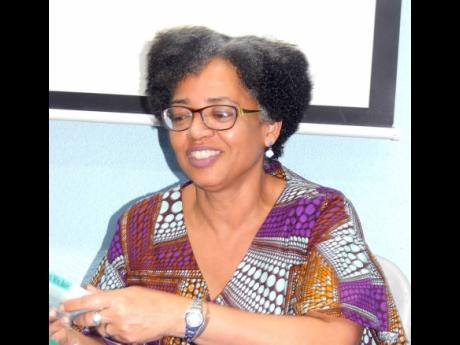UWI responds to surge of interest in creative writing
“CAN YOU imagine the surge in writing that will come out of the enforced isolation and increased anxiety of the COVID crisis?”
That question was asked this week by Dr Rachel Moseley-Wood, head of the Department of Literatures in English at The University of the West Indies, Mona. It was in relation to the department’s bachelor’s degree programme – writing, literature and publishing – due to start in September.
The programme is the only one of its kind in the English-speaking Caribbean, and with it, says Dr Moseley-Wood, “the department is responding to the needs of the community that we serve and attempting to imagine what the needs and demands of students and employers will be in the future”.
The department has observed “a huge interest in creative writing,” she added, citing as an example the fact that the current introduction to creative writing course is fully subscribed by students from several different faculties of the university. When, during our interview, I asked about the cause of the surge in interest. She replied: “I think that people, and young people in particular, see creative writing as a way of expressing themselves, making their voices heard, participating in public discourse and, with the opening up of different platforms for expression through the Internet, they see creative writing as something that can connect them in a meaningful way with other individuals, communities and audiences.”
Many young people, she said, find creative writing a way of communicating with themselves – “a way of working through trauma, a way of understanding the world and navigating it in a time of rapid change, when more traditional structures and traditional ways of coping don’t seem to work as well as they used to”.
But she quickly went on to dismiss the notion that creative writing and the department’s literature programmes, generally, were only about self-expression and abstract communication. The programmes give graduates what she called “soft skills” or “transferable skills,” explaining, “These types of skills do not prepare the graduate for a single, specific job or career, but they do prepare him or her to be adaptable and flexible in their career choices.”
VERSATILITY
The graduates, she said, “find jobs in all different kinds of sectors, from teaching to banking, to the police force to media and public relations. In fact, the skills developed by the literature degree and creative writing courses are precisely those skills that employers consistently identify as most valued – critical thinking, analysis, creativity, good written and verbal communication, the ability to conduct research, working with others and be part of a team.”
She said that the current COVID-19 crisis is showing that in a global environment that is constantly changing in myriad and often unexpected ways, the ability to adapt creatively may prove more valuable than training in a single, specialised profession or set of skills.
“Gone are the days when you can expect to stay in a single job for a lifetime,” she concluded.
The writing, literature and publishing programme combines courses that provide technical skills – like design, editing, proofreading, media production and marketing – with courses that emphasise writing skills, critical thinking, analysis and research.
In designing the programme, the Department of Literatures in English collaborated with a group of UWI-based professionals involved in publishing. Its members included Director of the UWI Press Dr Joseph Powell; editor of both the UWI’s flagship journal, Caribbean Quarterly, and of the Jamaica Journal, Dr Kim Robinson-Walcott; publications officer at the School of Education, Ms Heather Munro; and Annie Paul, the head of publications, Sir Arthur Lewis Institute of Social and Economic Studies, managing editor of the Social and Economic Studies journal, and editor-in-chief of the new online magazine of writing, PREE.
Over three years, students will take a combination of courses drawn from the BA literatures in English, the BA digital media production, the BA integrated marketing and communication and the minor in creative writing, as well as courses in publishing, specifically developed for the new programme.
In their third year, students will produce either a major creative writing or publishing project, or take a research course in literature, and will also undergo an internship to gain work experience and exposure to potential career options. Those options, 25 of which are listed in the programme’s brochures, include working in media, creative writing, publishing and advertising.

